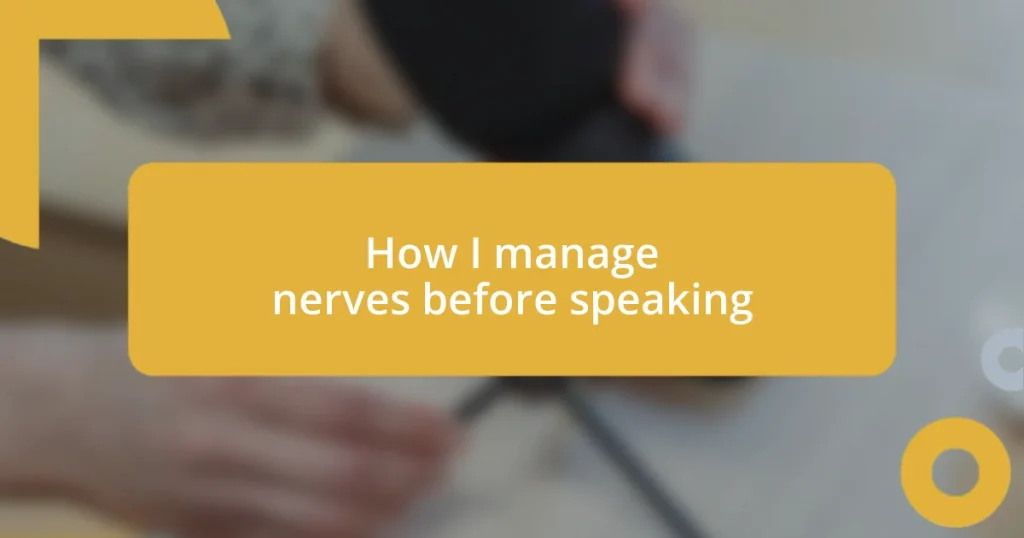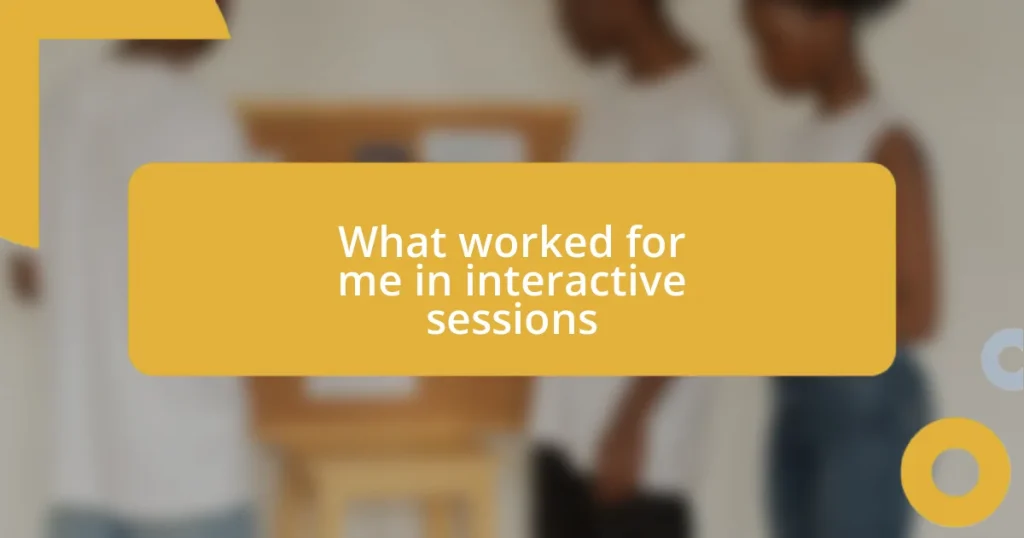Key takeaways:
- Transform nervousness into excitement by recognizing it as a sign of caring about your message.
- Incorporate deep breathing and physical activity into your routine to manage anxiety and boost confidence before speaking.
- Reflect on past successful speaking experiences and keep a “wins journal” to reinforce your capabilities and enhance self-confidence.

Understand my nervousness
Nervousness can often feel like an unwanted companion before I speak, almost like an old friend who shows up unannounced. Have you ever noticed how your heart races and your palms get sweaty at the thought of addressing an audience? It’s a physical manifestation of anticipation, and for me, it signals that I’m stepping into a space of vulnerability and potential connection.
There was a time when my nervousness would spiral into a paralyzing fear. I remember vividly standing backstage, my hands trembling, replaying every possible mistake in my mind. That moment taught me an important lesson: recognizing this anxiety as excitement instead of dread. It was a shift that changed everything. Isn’t it fascinating how we can redefine our experiences simply by changing our perspective?
Understanding my nervousness goes beyond acknowledging it; it’s about accepting it as part of the process. I often remind myself that feeling nervous means I care deeply about the message I’m about to deliver. Have you thought about how this emotional investment can actually enhance the impact of our words? Every time I face that nervous energy, I now embrace it, channeling it into my passion for sharing ideas rather than letting it hold me back.

Practice deep breathing techniques
Practicing deep breathing techniques has become a vital tool in my pre-speaking routine. When those nerves kick in, what’s fascinating is how my breath often becomes shallow and quick, amplifying my anxiety. By consciously taking deep, measured breaths, I can not only ground myself but also regain control over my body’s response. Have you ever tried focusing solely on your inhalation and exhalation? It’s just as calming as it sounds.
I remember a particularly nerve-racking presentation I had to give in front of a large audience. Backstage, I felt butterflies in my stomach, and my heart raced. Then, I closed my eyes and inhaled deeply, counting to four, and held my breath for four seconds before exhaling slowly for another four. This rhythmic breathing shifted my focus away from my racing thoughts to the calming sensations of my breath. I found myself feeling more centered and composed when I stepped onto the stage. Isn’t it incredible how something as simple as breath can transform our state of mind?
Integrating deep breathing techniques into my routine isn’t just about reducing nerves; it’s an empowering practice. Each time I take a moment to breathe deeply, I’m reminding myself that I hold the power over my emotional state. This intentional act fills me with confidence, allowing me to present my ideas more effectively. Have you experienced this shift? It can be a game-changer, opening up a world where nerves become a source of energy rather than fear.
| Technique | Description |
|---|---|
| 4-7-8 Breathing | Inhale for 4 seconds, hold for 7 seconds, exhale for 8 seconds. |
| Box Breathing | Inhale for 4 seconds, hold for 4 seconds, exhale for 4 seconds, hold for 4 seconds. |
| Diaphragmatic Breathing | Breath deeply into your diaphragm rather than shallow breathing in your chest. |

Visualize successful speaking
Visualizing successful speaking is one of my favorite techniques to combat nerves. Before stepping onto the stage, I often close my eyes and picture myself delivering a confident, engaging presentation. I can almost hear the audience’s laughter and applause, which fills me with an empowering sense of reassurance. Have you ever imagined the best version of yourself in a high-pressure situation? It can truly transform your mindset.
To enhance the visualization process, I focus on these strategies:
- Create vivid mental imagery: Picture every detail, from the room’s ambiance to the faces in the audience. The clearer the image, the more real it feels.
- Incorporate positive affirmations: I often repeat phrases like “I am prepared,” or “I am a confident speaker” in my mind while visualizing. These words resonate with me and build my self-esteem.
- Feel the emotions: I tap into the joy and excitement I’ll feel when I connect with my audience. Relishing those feelings helps me channel that energy positively on stage.
I remember vividly how this practice turned a daunting presentation on its head for me. Before a crucial talk, I sat quietly in a corner, picturing my success. As I envisioned each step, I felt the warmth of the audience’s engagement. By the time I stepped up to the microphone, I was not just less nervous; I was genuinely excited. It’s amazing how an internal script can set the stage for a beautiful performance, don’t you think? Visualization allows me to transform what was once anxiety into a thrilling anticipation of sharing my ideas.

Prepare thoroughly for speeches
Preparing thoroughly for speeches gives me a solid foundation that calms my nerves. I spend time crafting my message and organizing my thoughts. When I know my material inside and out, I can focus less on what I might forget and more on how I connect with my audience. Have you ever felt that anxious twinge when you’re unsure about your content? It’s a feeling I’ve learned to avoid through diligent preparation.
Rehearsing my speech multiple times makes a significant difference, too. I try to practice in front of a mirror or even with friends. Their feedback helps me refine my delivery and boosts my confidence. I vividly recall a time when I practiced a talk on a tight deadline. The more I rehearsed, the more at ease I felt. By the time I presented, it felt as though I was having a natural conversation rather than delivering a speech. Isn’t it remarkable how familiarity with our content can turn anxiety into excitement?
Additionally, I find creating a mental outline can be invaluable. I break down my speech into key points and visualize transitioning smoothly from one to the next. This technique eliminates the feeling of being lost or overwhelmed mid-presentation. I remember presenting a workshop where I confidently navigated between sections, leading to unexpected audience engagement. Have you ever noticed how clarity in structure can empower not just the speaker, but also invite listener engagement? That’s the magic of thorough preparation—it transforms the experience for everyone involved.

Use positive affirmations daily
Using positive affirmations daily has become a game-changer in how I handle nerves before speaking. When faced with an audience, I often remind myself of phrases like “I am capable” or “I am worthy of this moment.” These simple affirmations shift my mindset from doubt to empowerment. Have you ever noticed how a few encouraging words can change your entire outlook?
I remember a time before an important presentation when I felt a wave of anxiety wash over me. Instead of succumbing to it, I stood in front of the mirror and repeated affirmations that resonated with me. I could see my own reflection gradually shifting from a tense expression to one reflecting confidence. This practice not only calmed my nerves but also instilled a sense of belief that propelled me through the talk. Isn’t it fascinating how our thoughts can manifest our reality?
Integrating these affirmations into my daily routine has proven beneficial too. I find that saying them out loud during moments of solitude, such as in the shower or while cooking, reinforces their power. Over time, they’ve woven themselves into my psyche, helping me build resilience against any pre-presentation jitters. Have you tried incorporating affirmations into your routine? I genuinely believe they create a solid mental foundation that prepares you not just for speaking but for any challenge life throws your way.

Engage in physical activity
Engaging in physical activity has been a powerful tool for managing my pre-speaking nerves. Whether it’s a brisk walk, a quick jog, or even a few yoga stretches, moving my body helps to release pent-up energy and tension. I recall a time when I felt particularly anxious before a big presentation; I stepped outside, took a deep breath, and ran around the block. By the time I returned, I felt lighter, and it was easier to focus on my message rather than my nerves.
I’ve noticed that different forms of exercise produce different effects on my mindset. When I do strength training, for instance, I feel a surge of empowerment that translates directly into my speaking confidence. Have you ever felt that rush of adrenaline after a workout? It’s almost magical how this energy can shift my perspective from feeling vulnerable to embracing the opportunity to share my ideas. I often remind myself that my voice matters, and that little change in mindset can make all the difference.
Incorporating physical activity into my routine doesn’t just help on presentation days—it’s a part of my everyday life. Even a few minutes of stretching in the morning sets a positive tone for the day ahead. I encourage you to find a movement that resonates with you and make it a habit. How do you think incorporating physical activity could transform your own approach to facing nerves? I truly believe that this simple shift can create a ripple effect, enhancing both your physical and mental preparation.

Reflect on past successful experiences
Reflecting on past successful experiences can be a powerful antidote to nerves before speaking. I often think back to a time when I delivered a speech at a community event. Instead of focusing on what could go wrong, I revisited the feelings of pride and accomplishment I felt when the audience responded positively. Have you ever experienced that rush of joy after nailing a presentation? It can be tremendously reassuring, reminding us that we’ve been capable before, and we can be again.
One memorable moment was when I spoke at a workshop surrounded by peers I had spent years learning alongside. Initially, I experienced a twinge of anxiety, but recalling the supportive feedback from similar past interactions shifted my focus. I closed my eyes for a moment and remembered one person’s heartfelt compliment after a previous session. This reflection made the prospect of stepping onto the stage feel less daunting and more like an opportunity to connect. Isn’t it interesting how those little memories can reshape our mindset?
I also keep a “wins journal,” where I jot down positive feedback and experiences after each speaking engagement. This simple yet effective practice allows me to look back and remind myself of my growth and capabilities. Reading through those entries calms my nerves, making me realize that I have overcome challenges before, and I am equipped to do it again. Have you considered keeping a log of your own speaking successes? This kind of self-reflection can truly fortify your confidence just when you need it most.















